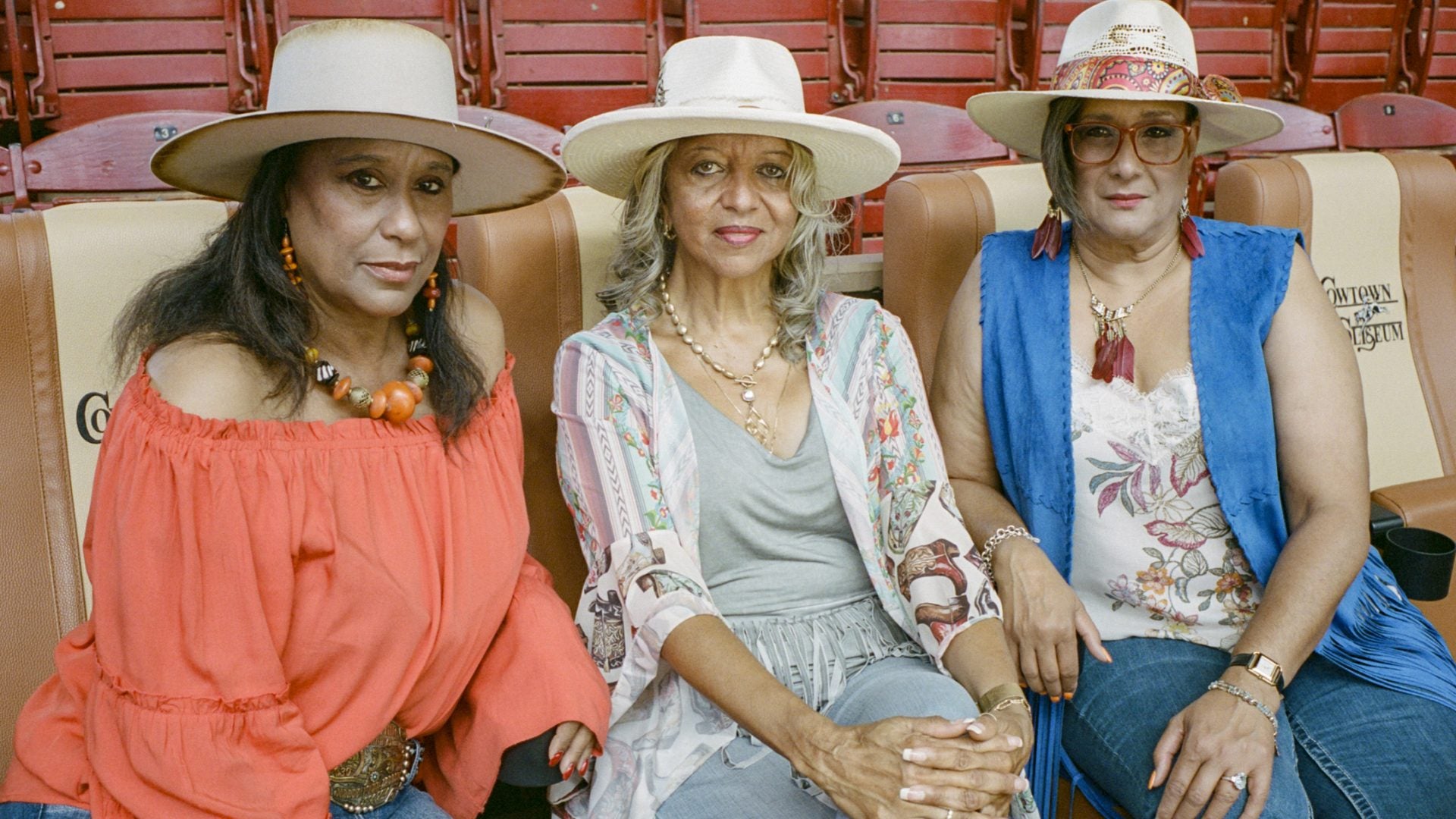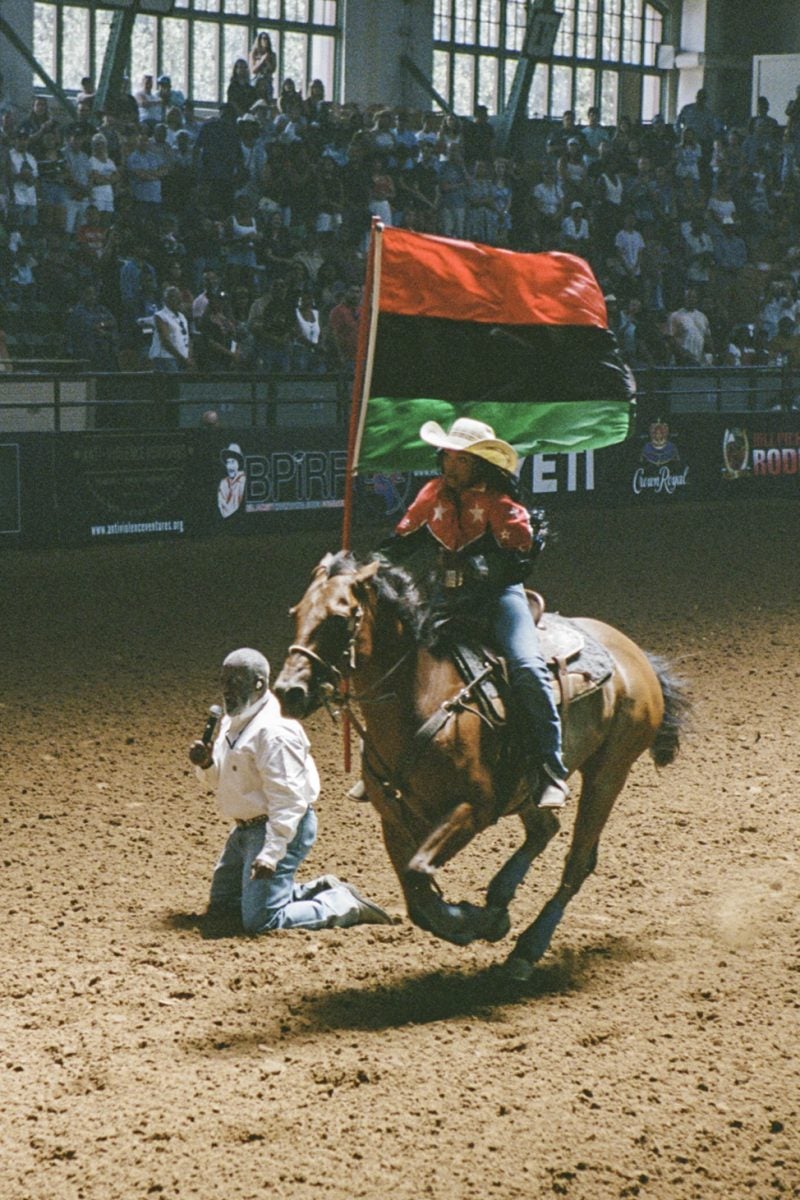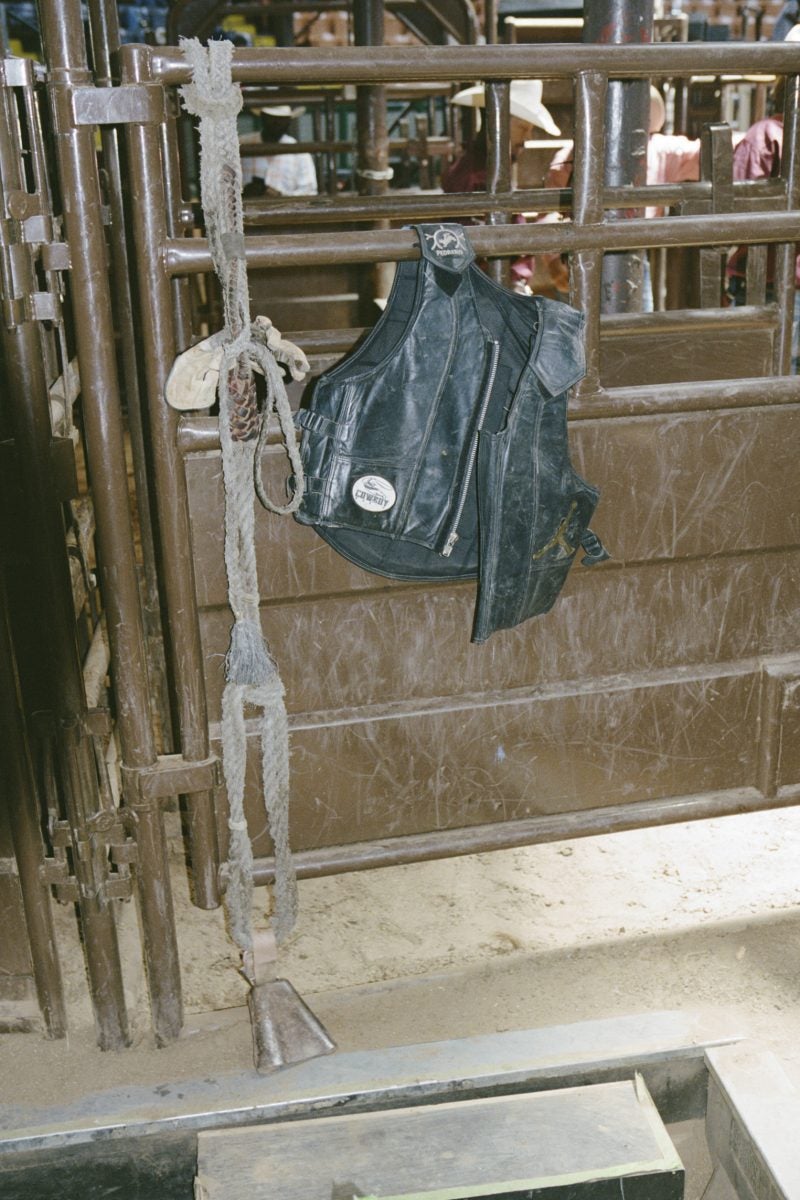
Texas has long been an almost mythical site for a genre of American theater. The famously maximalist state hosts the sensory exports of a Stars-and-Stripes cultural performance where ten-gallon hats, envelopes of dust, and whip-crack sounds create an immersive projection of Americana, long-preserved in popular culture for over a century. Beneath this romanticized veneer lies an accurate history of a diverse tapestry of people whose lives shaped the very fabric of the West. Its surrounding ephemera—with its wide-brimmed Stetsons and rugged leather boots—are the relics and materials of a breathing, irresistible heritage that continues to awe the world with how real it is. Cowboys and cowgirls of color often go unsung in the public imagination of the Wild West. Still, for over forty years, a coalition of Black elders have worked to crystalize their history by erecting their own showcase.
For years, Valeria Howard-Cunningham, President of the Bill Pickett Invitational Rodeo, has worked with a team of Black women leaders to preserve the underrepresented side of Western culture. Cunningham’s late husband, Lu Vason, started the rodeo in 1984 as an ode to Oklahoma cowboy Bill Pickett, a Black man who pioneered the art of bulldogging, or cattle wrestling. The contest of dominance between man and livestock doubles as a spectator event in the passing-down of rodeo tradition. Affectionately dubbed “The Greatest Show on Dirt,” the gathering is just as much of a reunion as it was a showcase, brimming with Southern congeniality and camaraderie. After her husband’s passing, Valeria was reluctant to continue the event in his stead but had seen the permeative impact in real time. If she was going to continue, she knew she needed an engaged sisterhood with the talents and love of heritage to expand what Lu had started.
For generations of young Black cowboys and cowgirls, the popularity of the rodeo circuit is not a new phenomenon. Many were generationally raised in the tradition of learning how to ride horses and compete in events in early childhood. Fourteen-year-old Kourtnee Solomon, one of the young champions of BIPR, is a fifth-generation cowgirl, first riding a horse at three years old, competing in peewee barrel racing by six. The practices of riding and lassoing have been passed down and preserved matrilineally for the better part of a century. Solomon and her fellow youth competitors hail from different states, traveling across the country and forming sustaining kinships.
Those doing the work to put on the events hail from various silos of Black preservationist programming. Founder Lu Vason—who passed away in 2015—exuded an admiration for Black Western folkways that were intimately true to life. For the past ten years, his wife Valeria has thoughtfully curated a team of Black women event coordinators and promoters similarly motivated to amplify this history as Lu was. Many of these co-producers and generations of Vason’s progeny have been raised in the scene, from peewee barrel racing to adults’ competitive bull riding. Lu and Valeria met on a flight back when he was hosting the early rodeos, inviting her to join at the events. Unfortunately, she had prior plans—Michael Jackson’s Thriller concert in Denver, CO. “Back at that time, I wasn’t sure what a rodeo involved,” Valeria tells ESSENCE. “He was so passionate about it, and over time, I learned more and immersed myself. It’s an entire culture—people have ideas from television, but we [Black cowboys] exist in great numbers. For some, it’s a serious hobby, and for many others, it’s a livelihood.”
The group that Valeria convened to continue on the rodeo after Lu’s passing includes Black women who’ve worked at various silos of music, entrepreneurship, and activism. Lu was initially a music promoter, working with groups like The Pointer Sisters or The Whispers before he attended his first rodeo and became encapsulated into the culture. For this generational group, there were clear throughlines in work that amplified the unsung histories of African Americans: the need for collective action, the power of storytelling, and the importance of visibility. Today, partnerships are led by a Johnson Family Publishing and NAACP alumna, Margo Wade LaDrew, who spent much of her career fundraising and leading Black beauty partnerships across corporate entities.
“Back then,” LaDrew tells ESSENCE, “the community of Black-owned businesses was emphatic about helping one another. If there were something someone could do to help with an event or fundraising goal, they would contribute in ways they could because we were all we had.” Structurally, as LaDrew refers, there was a quiet force behind the scenes of Black coalition building, be it in music, beauty, or, ultimately, the rodeo scene. Booking acts, not unlike planning events, was a practice of cultural enfranchisement, a way to assert the presence of Black artistry in spaces that had long denied it. If they were going to do the same in this industry, they had to be architects, designing not just a showcase but the infrastructure of a heritage movement.
“Many of the places we’ve traveled, they’d never seen this before,” says Acynthia Villery, the first African American female rodeo announcer with the Bill Pickett Invitational. “We get to bring something to audiences from across the country and around the world—and many of the folks watching have never been around horses or cowboys and cowgirls before.” Villery, a third-generation Black rodeo woman herself, takes pride in providing a signature voice to the association’s continuously expanding reach. With the help of Valeria, Margo, and other cohort members Stephanie Haynes and Denise Tyus, BPIR has forged philanthropic partnerships with key players committed to preserving the voices of Black people in country music, rodeo competitions, and agriculture. Providing representations of Black artistry within the arena is as much a part of entertainment as it is a component of a larger struggle to maintain Black cultural production as resistance, a way to carve out a space in a world that too often tried to erase it.
Today, BIPR’s impact network extends beyond the arena, with the Bill Pickett College Fund supporting young people through activations like Soul Country Music Star, which opens doors for Black country artists. Under the dynamic leadership of association President Valeria Howard-Cunningham and her team of experienced producers, the BPIR has transformed into a vibrant celebration of education and inspiration, weaving together communities and delighting sell-out crowds from coast to coast.
In reality, the symbolic imagery of horseback heroism, so often associated with solitary cowboys and gunslingers, owes its existence to the complex, multicultural history of cattle ranching in the United States. Long before the advent of Western cinema, Native Americans were stewards of these lands, and their knowledge of the terrain and cattle handling was fundamental to the survival and success of ranching. Like so many others, their contribution was overshadowed by the glorified image of the white cowboy, but it remains woven into the legacy of the West. African American cowboys and Mexican vaqueros found their contributions minimized, their skills appropriated and repackaged in a way that erased their integral role in shaping the cowboy identity. BIPR is one of the only contemporary players uplifting a more accurate retelling of history with such a joyful display of popular Americana. The origins of the rodeo are familially intimate, expanding in parallel with the progression of a family raised in the arena and more reflective of a culture than popular imagery typically indicates.
As BIPR President Valeria Howard-Cunningham reflects on the rodeo’s growth, she remarks, “When I sit back and reflect on this year… it is much more emotional,” a testament to the enduring legacy and the powerful community that continues to ride alongside the Bill Pickett Invitational Rodeo. The arena becomes a stage where past and present collide, and tradition is honored and revitalized with each event. Every ride, every steer wrestle, is a nod to the larger narrative of the Black cowgirls, a figure often erased from the annals of Western history. The rodeo is not just about who crosses the finish line but about who carries the torch of a legacy that refuses to be forgotten. At its core, the Bill Pickett Invitational Rodeo is a celebration of resilience. Whether in the saddle or the audience, each participant contributes to a shared story that spans decades, a story of struggle, triumph, and the unyielding spirit of a community that continues to ride on.
Creative Director + Producer: Chanel Hinds
Creative Producer: Love Soulèy














